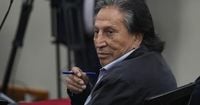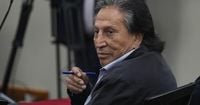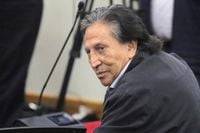On September 3, 2025, a Peruvian court delivered a resounding verdict: Alejandro Toledo, the country’s former president, was sentenced to 13 years and four months in prison for money laundering. This marked the second major conviction for Toledo, who led Peru from 2001 to 2006, and it further cemented the far-reaching impact of the Odebrecht corruption scandal, which has shaken Latin American politics for more than a decade.
Toledo, now 79, stood accused of using bribe money from the Brazilian construction giant Odebrecht—now known as Novonor—to acquire high-value real estate in Lima, Peru’s bustling capital. According to Reuters and the Associated Press, prosecutors detailed how Toledo and his wife funneled $5.1 million through an offshore company in Costa Rica to launder the illicit cash. The funds were used to purchase a house and an office in an upscale Lima neighborhood, as well as to pay off mortgages on two other properties. The court, presided over by Judge Josefa Izaga, found that the former president had orchestrated a complex financial scheme to conceal the origins of the bribery proceeds.
This conviction follows an earlier, even more severe sentence handed down in October 2024. Back then, Toledo was found guilty of accepting up to $35 million in bribes from Odebrecht in exchange for awarding the company lucrative public works contracts. For that crime, he was sentenced to 20 years and six months in prison. Now, with both sentences being served concurrently, Toledo faces the prospect of spending his remaining years behind bars.
The revelations about Toledo’s actions are part of the broader “Car Wash” investigation, a sprawling anti-corruption probe that began in Brazil and eventually ensnared politicians and business leaders across the continent. According to the Associated Press, the scandal has implicated governments throughout Latin America and nearly every Peruvian president this century. In fact, the very prison in Lima where Toledo is now held also houses three other former Peruvian presidents: Ollanta Humala, Pedro Castillo, and Martin Vizcarra. It’s a dramatic testament to the scale and reach of the Odebrecht affair.
For many Peruvians, the details of Toledo’s case are both infuriating and familiar. Prosecutors described how the former president and his wife established an offshore company in Costa Rica, which served as a conduit for the bribe money. The funds were then used to snap up prime real estate in Lima, including a lavish home and an office, while also settling outstanding mortgages on two additional properties. As Reuters reported, these purchases were not simply extravagant—they were a calculated effort to turn dirty money into seemingly legitimate assets.
Toledo’s background only adds to the sense of national disappointment. An economist with advanced degrees from Stanford University and the University of San Francisco, he once represented hope for democratic reform and economic modernization in Peru. Yet, his fall from grace has been as dramatic as it has been public. The Associated Press noted that, during sentencing, Judge Josefa Izaga made clear the gravity of the offense, emphasizing the deliberate nature of the money laundering scheme.
The sentences handed down to Toledo are part of a larger pattern. The Odebrecht cases have become a symbol of endemic corruption in Latin America, revealing how powerful companies and politicians colluded to siphon billions from public coffers. According to Reuters, nearly all of Peru’s presidents in the 21st century have been implicated in the scandal. The fact that Toledo is now serving time alongside Humala, Castillo, and Vizcarra underscores just how pervasive the problem has become in the country’s highest offices.
And the reverberations are far from over. Another former president, Pedro Pablo Kuczynski, now 86, is currently on trial for his alleged role in the Odebrecht scheme. Prosecutors are seeking a 35-year sentence against him, according to multiple news agencies. The ongoing legal proceedings against Kuczynski suggest that Peru’s reckoning with corruption is still unfolding, with more twists and turns likely to come.
For Toledo, the legal troubles are compounded by the fact that his sentences stem from two separate but closely related cases. In the first, he was found to have accepted up to $35 million in bribes from Odebrecht in exchange for steering lucrative government contracts toward the company. In the second, he was convicted of laundering $5.1 million of those bribes through offshore accounts and into the Peruvian real estate market. The court determined that both sets of crimes were part of a coordinated effort to enrich himself at the expense of the Peruvian people.
The magnitude of the “Car Wash” scandal cannot be overstated. Originating in Brazil, the investigation exposed a vast network of kickbacks, shell companies, and political favors stretching from Mexico to Argentina. Odebrecht, once one of the most powerful construction firms in the region, has since rebranded as Novonor in an attempt to distance itself from its tainted legacy. But for many in Peru and beyond, the damage has already been done. The BBC and other outlets have chronicled how the scandal has eroded public trust in institutions and left a legacy of cynicism and disillusionment.
It’s worth noting that Toledo is not alone in his predicament. The Lima police base that now serves as his prison cell has become an unlikely gathering place for former heads of state. According to Reuters, Ollanta Humala, Pedro Castillo, and Martin Vizcarra are all serving time there for their own roles in various corruption scandals. The image of four former presidents sharing a single facility is a stark illustration of the crisis of governance that has plagued Peru in recent years.
As for Toledo’s personal fate, the concurrent nature of his sentences means that he will not serve more than 20 years and six months in total. Still, at age 79, it is highly unlikely that he will ever regain his freedom. The court’s decision to impose the sentences concurrently reflects a legal principle designed to avoid disproportionately long punishments for related crimes, but it also underscores the seriousness of Toledo’s offenses.
Meanwhile, the Peruvian public continues to grapple with the fallout from the Odebrecht scandal. The sheer scale of the corruption has left many citizens questioning the integrity of their leaders and the effectiveness of the country’s legal system. Yet, the successful prosecution of Toledo and others also demonstrates a measure of accountability—however belated—that some hope will mark the beginning of a new era in Peruvian politics.
With another former president, Pedro Pablo Kuczynski, still facing trial and the specter of further revelations looming, Peru’s struggle with corruption is far from over. But the conviction and sentencing of Alejandro Toledo stand as a powerful reminder that even the most powerful figures are not above the law.



